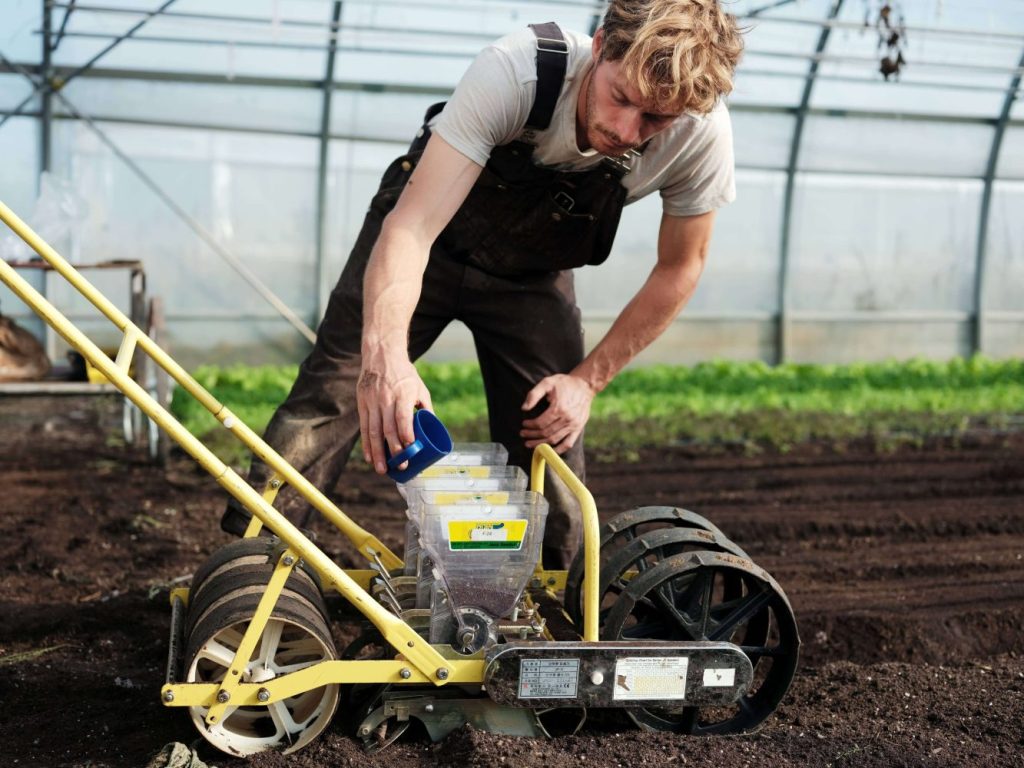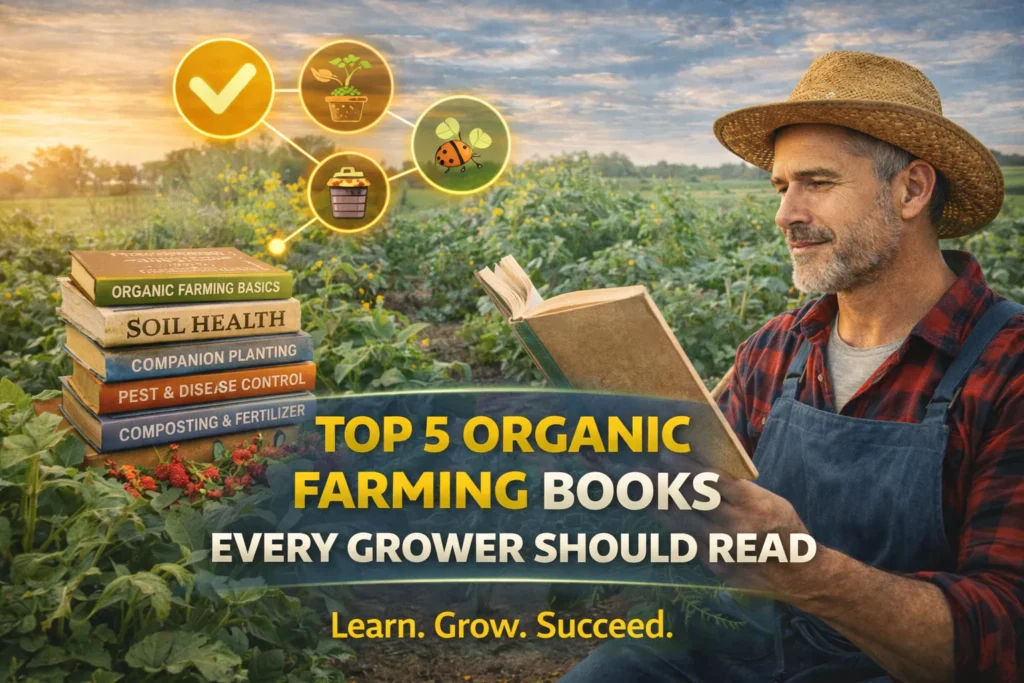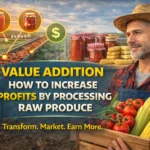If you’re passionate about sustainable agriculture and eager to transform your farming practices, diving into the world of organic farming books is a fantastic step. Organic farming isn’t just a trend; it’s a movement towards healthier soil, crops, and ecosystems.
But with countless books on the market, where should you start? That’s where this guide comes in. Discover the top 5 organic farming books that every grower should read to unlock the secrets of successful organic agriculture. Whether you’re a seasoned farmer or just starting, these books offer invaluable insights, practical tips, and innovative strategies to help you cultivate your land more sustainably and effectively.
Ready to enrich your farming knowledge and boost your productivity? Let’s delve into these essential reads that will revolutionize your approach to organic farming!

Benefits Of Organic Farming
Organic farming enhances soil health, promotes biodiversity, and reduces chemical usage. Explore these top five books to learn more.
Organic farming is more than just a trend; it’s a movement towards a healthier lifestyle and a more sustainable planet. By choosing organic methods, you contribute to a system that prioritizes environmental health, animal welfare, and food safety. Organic farming can reduce your carbon footprint and help preserve our natural resources. But, what are the specific benefits that make organic farming a worthwhile endeavor for growers like you?
Environmental Impact
Organic farming significantly reduces pollution and conserves water. By avoiding synthetic fertilizers and pesticides, you help maintain soil health and prevent harmful chemicals from entering waterways. This means a safer environment for your community and future generations.
Healthier Produce
Organic produce often contains higher levels of essential nutrients like vitamins, minerals, and antioxidants. When you grow organic, you provide your customers with food that’s not only fresh but also packed with health benefits. Imagine the satisfaction of knowing your tomatoes are free from toxic residues!
Cost-effectiveness
While it may seem that organic farming requires more effort, it can actually save you money in the long run. Using natural pest control methods and crop rotation reduces the need for expensive synthetic inputs. Plus, organic products often fetch higher prices, increasing your profit margins.
Improved Soil Quality
Organic farming builds soil health through natural practices like composting and cover cropping. Healthy soil leads to better plant growth and higher yields. Have you ever considered how much richer your garden could be with nutrient-dense soil supporting every seed you plant?
Community And Economic Benefits
Organic farms often engage local communities, creating jobs and supporting local economies. As a grower, you can foster connections with local markets and consumers who value sustainable practices. This not only boosts your business but also strengthens community ties.
What experiences have you had with organic farming? Have you noticed these benefits in your own practices? Engaging with these concepts can transform not just your farm but also your approach to agriculture. By understanding and utilizing the advantages of organic farming, you become part of a larger, impactful movement towards sustainability.

Criteria For Selecting Books
Choosing the right book can be a game-changer in your organic farming journey. But with so many options out there, how do you pick the best ones? The criteria for selecting books is crucial to ensure you invest your time wisely. Let’s dive into what you should look for when selecting organic farming books.
1. Expertise Of The Author
When selecting a book, the author’s expertise is a key factor. An author with hands-on experience in organic farming offers practical insights. You gain knowledge that is tried and tested, not just theoretical.
Check for authors who have a background in agriculture or environmental science. This ensures the book is grounded in real-world knowledge.
2. Depth Of Content
Evaluate the depth of the content. A good book should cover a range of topics within organic farming. Look for books that explore soil health, pest management, and crop rotation.
A book that dives deep into these areas provides a comprehensive understanding. Avoid books that skim the surface without offering actionable advice.
3. Reader Reviews And Recommendations
Reader reviews are invaluable. They offer insights into the book’s effectiveness and readability. A book with positive reviews from other growers is likely a good choice.
Consider recommendations from trusted sources in the organic farming community. This adds credibility to your selection process.
4. Practical Applications
Ensure the book includes practical applications. It should offer techniques you can implement on your farm immediately. Books that include step-by-step guides or case studies are particularly useful.
Think about whether the book can help solve specific challenges you face. This makes the reading experience more relevant and rewarding.
5. Up-to-date Information
Organic farming is an evolving field. Select books that are up-to-date with current practices and technologies. This keeps you informed about the latest trends and innovations.
Look for recent publications or updated editions. This ensures the information you receive is current and applicable.
Have you ever picked a book that changed your farming approach entirely? The right book can be a catalyst for innovation and improvement in your organic farming practices. Choose wisely, and let these criteria guide your selection process.
Book Reviews And Highlights
Explore essential reads on organic farming with our selection of top five books. Gain valuable insights into sustainable practices. Perfect for growers seeking to deepen their understanding of organic methods and principles.
Embarking on the journey of organic farming can be both exciting and daunting. Whether you’re a novice or an experienced grower, the right resources can make all the difference. The top five organic farming books highlighted here offer invaluable insights, tips, and techniques that can transform your farming practices. From cultivating your garden to understanding companion planting, these book reviews and highlights will guide you through the essentials of organic farming.
The Organic Gardener’s Handbook
If you’re seeking a comprehensive guide to organic gardening, this book is a treasure trove of knowledge. It covers everything from soil health to pest management with practical, easy-to-follow instructions. One reader shared how this book transformed their backyard into a thriving organic oasis, showcasing its tangible impact on gardening practices.
The New Organic Grower
This book is often hailed as a bible for modern organic farmers. With over 30 years of experience, the author provides tried-and-true methods for sustainable farming. One compelling aspect is its emphasis on the efficiency and productivity of small-scale farms. Have you ever thought about maximizing output on a small plot of land? This book will show you how.
Organic Farming: Everything You Need To Know
For those new to organic farming, this book breaks down the basics in an approachable manner. It covers topics like crop rotation and green manure, making it a valuable resource for beginners. One reader noted how the book’s clear explanations and step-by-step guides boosted their confidence in managing their farm organically.
The Urban Farmer
Urban farming is on the rise, and this book is your go-to guide for growing in the city. It offers innovative techniques for maximizing space and improving yield in urban environments. If you’ve ever wondered how to transform a small balcony or city rooftop into a productive garden, this book provides actionable insights and real-world examples.
Carrots Love Tomatoes
Companion planting is an art, and this book is a masterpiece on the subject. It delves into the symbiotic relationships between different plants, enhancing both growth and taste. Many readers find themselves surprised by the simple combinations that work wonders in their gardens. Have you tried pairing your crops for better results? This book could be your secret weapon.
Incorporate these books into your reading list to enhance your organic farming knowledge. Each one offers a unique perspective, ensuring you have a well-rounded approach to sustainable agriculture. Which book will you start with?

Applying Knowledge From Books
Books hold a treasure trove of wisdom for organic farming enthusiasts. Applying knowledge from books can transform theoretical concepts into practical success. Understanding, adapting, and implementing strategies from books can enhance your farming techniques. The key lies in translating written words into actionable insights.
Understanding Principles
Organic farming books explain foundational principles. These principles guide sustainable practices. They offer insights into soil health, crop rotation, and pest control. Understanding these principles helps growers maintain eco-friendly farms.
Adapting Techniques
Books showcase diverse farming techniques. Each technique can be adjusted to fit your farm’s needs. Adaptation requires experimenting with methods. This ensures they align with your unique environmental conditions.
Implementing Strategies
Books provide strategic plans for successful farming. Implementing these strategies involves careful planning. It requires setting clear goals and step-by-step execution. This process ensures the strategies work effectively.
Continuous Learning
Organic farming is ever-evolving. Staying updated with new information is vital. Books encourage continuous learning. They help farmers stay informed about innovative practices and trends.
Sharing Knowledge
Books facilitate knowledge sharing among growers. Sharing insights from books enriches community farming practices. It fosters collaboration and collective growth. This strengthens the organic farming community.
Conclusion
Organic farming books offer valuable insights for growers. These top picks cover diverse topics. Each book enriches your understanding of sustainable practices. Learn about soil health, crop rotation, and pest management. Discover techniques to improve yields naturally. These reads inspire change and innovation.
They guide you towards a greener future. Embrace the knowledge shared by experienced authors. Growers benefit from practical advice and wisdom. These books are essential for anyone passionate about organic farming. Dive into them and watch your skills blossom. Your journey in organic farming starts with knowledge.



